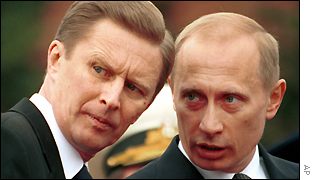Thursday, December 11
US bans anti-war countries from Iraq deals
Governments outraged by ploy aimed at getting more troops
Julian Borger in Washington, Luke Harding in Berlin and Ewen MacAskill
Thursday December 11, 2003
The Guardian
The Pentagon's decision to exclude countries that opposed the Iraq invasion from bidding for reconstruction contracts provoked anger and incredulity in the capitals involved yesterday.
The bar on French, German, Russian and Canadian companies seeking more than $18bn (£10bn) in contracts, announced in a memorandum by the US deputy defence secretary, Paul Wolfowitz, immediately stalled attempts to heal post-war rifts.
The EU said it intended to examine whether the decision violated World Trade Organisation rules.
"We are asking the US to provide us with information so we can see whether or not their commitments with regard to the WTO have been respected," Arancha González, the trade spokeswoman for the European commission, told Reuters.
The first casualty was Washington's attempt to have Iraq's international debts written off, which is being led by a special White House envoy, the former secretary of state James Baker.

Russia's defence minister, Sergei Ivanov, declared that Moscow was not interested in a deal, reversing the Putin government's readiness to negotiate.
"Iraq's debt to the Russian Federation comes to $8bn and as far as the Russian government's position on this, it is not planning any kind of a write-off of that debt," Mr Ivanov said.
The Pentagon's decision boosts the chances of British companies winning contracts, but the government was privately dismayed.
It is anxious that France and Germany should become involved in Iraq next year, and with as broad an international coalition as possible. It does not regard the US snub as helpful.
It wants French and German support for a new UN resolution in the spring to back the political process for a partial transfer of power to Iraqis, and for a UN-endorsed international force along the lines of those in Afghanistan and East Timor.
The German government spokesman, Bela Anda, said the decision was "not acceptable" and in contravention of "a spirit of looking to the future together".
The snub appears to have stunned German officials, who had believed that Berlin's relationship with Washington had improved since Chancellor Gerhard Schröder's meeting with President Bush in September.
The foreign minister, Joschka Fischer, said Germany had greeted the news with "astonishment".
The Canadian government threatened to cut off its contributions to the international reconstruction effort. In Paris a government spokesman questioned the legality of the restrictions under international trade regulations.
[...more]

